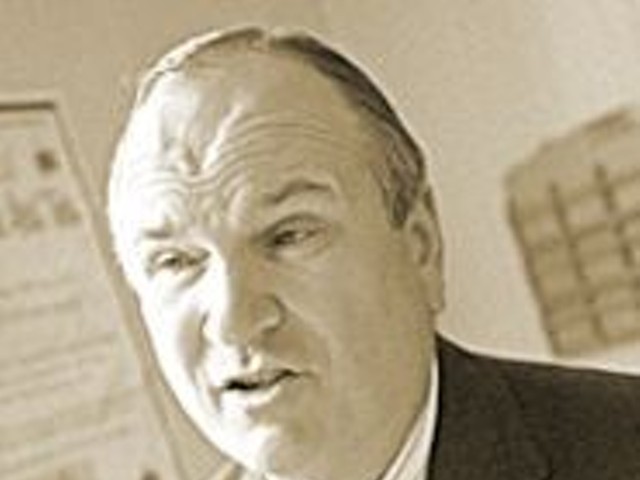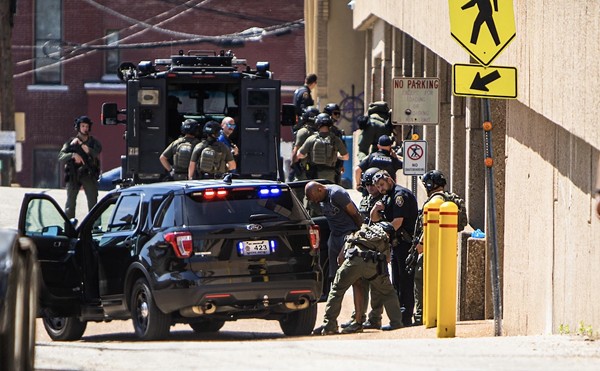Last month, the minister-media magnate-gadfly led several dozen protesters on a march down Washington to criticize the millions being spent on street improvements that no one thought were important until loft-dwellers moved in. The city, Rice and the protesters said, shouldn't be buying fancy brick sidewalks and streetlights when people are hungry.
Rice's riling City Hall is nothing new. But now he is upsetting some neighbors by using City Hall to dictate who will be allowed to run Washington Avenue bars near his shelter.
Even as Rice hit the streets, he and homeless residents of New Life Evangelistic Center at 1411 Locust Street were quietly torpedoing liquor-license applications for two nearby nightclubs. Last month, owners of Deep Six at 1511 Washington Avenue dropped a proposal to transfer their license after more than a dozen homeless people who stay at Rice's shelter signed protest petitions, effectively preventing the current owner from selling. Robert Kraiberg, city excise commissioner, says Deep Six didn't get enough signatures in support of its application, but New Life took no chances, sending the center's lawyer to a June 17 hearing on the license transfer. A dozen New Life residents also signed petitions to block the sale of Tequila's, a nightclub at 1312 Washington that closed when its owners were evicted before a June hearing on a proposed license transfer.
The city grants considerable power to neighbors of bars and nightclubs that want to stay open until 3 a.m. Unless a liquor-license applicant collects signatures of support from a majority of property owners, registered voters and residents within 500 feet of his business, he might just as well stay home. The city also gives opponents of late-night bars plenty of opportunities to protest. Rice for the first time has taken full advantage, casting a shadow of uncertainty on a gentrifying neighborhood that has long been one of the city's hottest nightclub districts. "The phenomenon of the New Life Evangelistic Center being involved in a protest is new," Kraiberg says.
Charlie Hale, New Life's business office manager, says the homeless are merely joining with others in the neighborhood to stop proposals that are bad for everyone. "Obviously, if we were the only ones against them, we wouldn't be winning," Hale says. "We try to look out for the entire area."
Records at the city excise commissioner's office show that twelve of the 39 signatures against Tequila's license application came from people who gave their address as New Life. In the case of Deep Six, thirteen of the 20 people who signed protest petitions provided New Life as their address. So far as Hale is concerned, shelter residents have as much right as anyone else to protest liquor-license applications. And they're under no pressure, he insists. "They're living here -- regardless of how long, they're in the area," Hale says. "They know what's going on. It's not something that we force them to do -- it's not like you sign this or you're out of here. We tell them the situation and they sign."
And that has some club owners crying foul.
"The idea that he [Rice] can influence my business really upsets me -- I mean, really upsets me," says Tom Gray, owner of Velvet, oldest of at least nine clubs on the Washington Avenue strip. "He registers homeless people to vote so they can protest a license. It's an abuse of a privilege that, really, he has no business employing at all. It totally infuriates me. Larry Rice has just got a huge bone up his ass because they spent all that money on the street. He's just mad because they've spent all the money on the street and he's not getting any of it. He's a total blight on the city of St. Louis. The guys who live there, they break into cars, they beg for money. These are the guys who are committing the crime in the area. If that place wasn't around, this would be one of the safest neighborhoods in the metro area, I swear."
Despite Gray's problems with Rice, he agrees with the opponents of the Tequila's and Deep Six license applications. Neither of the clubs, which opened in the spring of 2002, was well run, he says. "These guys are clowns," Gray says. "They give what I do a bad name."
Excise commission files show that Deep Six has been cited for allowing patrons and an open container on premises after hours. The excise commissioner's office has also busted the club for serving underage customers and not conducting required background checks on employees. In March, Kraiberg met with neighbors and Edward Cezar, the license holder, to discuss security issues, open containers and public urination problems.
Tequila's lost its liquor license for three days after the excise commissioner's office in November caught the club serving four underage patrons, including an eighteen-year-old girl, who the doorman said he'd admitted without IDs because they were regular customers. Tequila's has also been cited for allowing patrons to drink after hours and illegally advertising free margaritas.
Cezar did not return a phone call. Arjun B. Singh, manager at Tequila's who tried to get the liquor license transferred into his name, blames the club's landlord, Kraiberg and Matthew O'Leary, a Washington Avenue resident who sits on the board of the Downtown St. Louis Residents Association, for blocking the application. "Nobody really complained to us," Singh says. "We would hear complaints from our landlord and the excise commissioner." Singh says he believes racism played a role. The powers that be simply didn't like hip-hop night, he says, although he admits that the club was behind on its rent when it was evicted.
O'Leary says hip-hop night had nothing to do with neighborhood concerns. "Most of the problems from Tequila's resulted from inexperienced club owners taking over a license and not knowing what was expected of them in the neighborhood and doing things in violation of their license," O'Leary says.
Washington Avenue is no different than the Central West End and the Loop when it comes to bars abutting residential areas, O'Leary says. "There is certainly the potential for conflict if the situation isn't properly managed, and there has been conflict," he says. "Most of the basis for the conflict results from the conduct of patrons of the bars and clubs when they're outside of the establishments, which has been bad at times. There have been instances of cars blocking garage doors, public urination, excessive noise, excessive honking -- just various types of not-very-civil behavior. I don't think anyone thinks we should get rid of the clubs and bars entirely. I think everyone understands the residents are here to stay. So it's just a matter of trying to find a happy medium."
Neither O'Leary nor Hale rules out more protests that could scuttle more business plans. "The level of risk that a club or bar owner bears is probably directly related to how they conduct their business during the time that they're open," O'Leary says.
This is a problem that may solve itself if Washington Avenue rents continue to increase, forcing out the larger clubs that make ends meet with weekend parties that lure hundreds of customers. "I'm sure it will happen," Gray says. "I don't have to worry about that for a couple more years -- I've got frozen rent. You're here, I'm here, we either have to get along or there's going to be some serious problems.
"We try to get along, and that's the way I'm going to look at it until I have a problem," Gray says.





